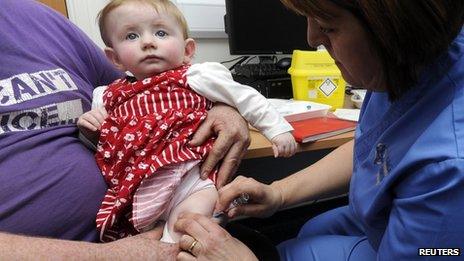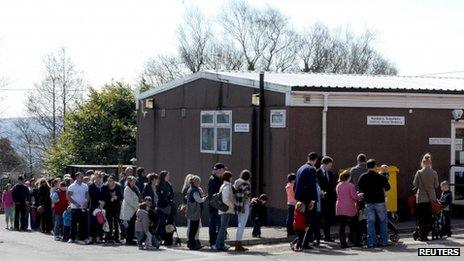Measles: More vaccination clinics to tackle Swansea epidemic
- Published

Drop-in clinics were held in Swansea, Bridgend and Neath Port Talbot hospitals on Saturday
More vaccination sessions are being laid on to ensure children at risk of measles in the Swansea epidemic receive the MMR jab.
More than 1,720 people were vaccinated at special hospital drop-in clinics at the weekend, with reported cases rising to nearly 600.
Some GP surgeries will also be holding clinics this week, while more drop-in sessions will be held next Saturday.
Local health officials say it is too early to say if cases have peaked.
Hundreds queued at the four hospitals in Swansea, Neath Port Talbot and Bridgend on Saturday to receive the free MMR jabs.
Health officials confirmed 612 people were vaccinated at two hospitals in Swansea, another 611 in Bridgend and 503 at Neath Port Talbot.
The sessions, targeting children and adolescents who had not had their scheduled MMR jabs as babies and toddlers, were laid on after an initial slow uptake of the vaccine as the epidemic took hold.
Public Health Wales said demand for the vaccine on Saturday was 50% higher than anticipated.
Queues started forming outside one hospital, Morriston in Swansea, an hour before the doors opened.
But Prof Andrew Davies, chair of Abertawe Bro Morgannwg University Health Board (ABMU), which oversees hospitals in the main outbreak area, said he understood some people who had turned up at the clinics did not receive the jab after deciding the queues were too long.
He said GPs surgeries would be able to give the MMR vaccine this week and he understood some would also be holding special vaccination clinics.
"Clearly parents and carers are quite rightly concerned about the measles outbreak which is the largest we have seen in decades," he told BBC Radio Wales.
Prof Davies said it was "too early to say if the measles epidemic had peaked" as it takes two weeks from catching the disease to symptoms developing.
He said that those who received the first vaccine would have about 95% protection against measles. The second booster vaccine - which can be given a month later - would ensure around 99% protection.
Further drop-in clinics will be held at the four hospitals this Saturday, while the jab will also be given in schools following the Easter break.
'Vaccine widely tested'
Prior to the introduction of the Measles vaccination in 1968, around 500,000 children caught measles and about 100 died as result each year in the UK
Concerns over the jab's safety were raised in the late 1990s when surgeon Andrew Wakefield published a since discredited paper in The Lancet suggesting MMR was linked to an increased risk of autism.
That paper, and subsequent media coverage, led to immunisation rates plummeting.
Labour peer and scientist Lord Robert Winston has insisted the vaccine is safe.
"We need to encourage people to understand that this is a safe vaccine and it's been widely tested and there's no evidence at all of autism with it, which can now be held up to any sense of credibility," he said.
He also told BBC Radio Wales that he feared there might be cases of men left infertile after catching mumps - which the MMR also vaccinates against.
"We want to stress that we're not in any way judgmental about why their children may have missed the MMR in the past," said ABMU's director of public health Sara Hayes.
"The important thing is that they get the jab now."
Public health officials say there are so far 588 confirmed measles cases in the south Wales outbreak.
Although the epidemic is based in Swansea, cases continue to be reported across Wales.
The majority are in Abertawe Bro Morgannwg, which as well as Swansea also includes Neath, Port Talbot and Bridgend; there are also cases in Powys and the Hywel Dda Health Board area, which covers Carmarthenshire, Ceredigion and Pembrokeshire.
Officials have said it is "just a matter of time" before a child is left with serious and permanent complications, such as eye disorders, deafness or brain damage, or even dies.
Typical symptoms of measles include fever, cough, conjunctivitis and a rash. Complications are quite common even in healthy people, and about 20% of reported measles cases experience one or more complication.
These can include ear infections, vomiting and diarrhoea, pneumonia, meningitis and serious eye disorders.

Queues at Morriston Hospital on Saturday
- Published6 April 2013
- Published6 April 2013
- Published6 April 2013
- Published4 April 2013
- Published5 April 2013
- Published3 April 2013
- Published3 April 2013
- Published29 March 2013
- Published27 March 2013